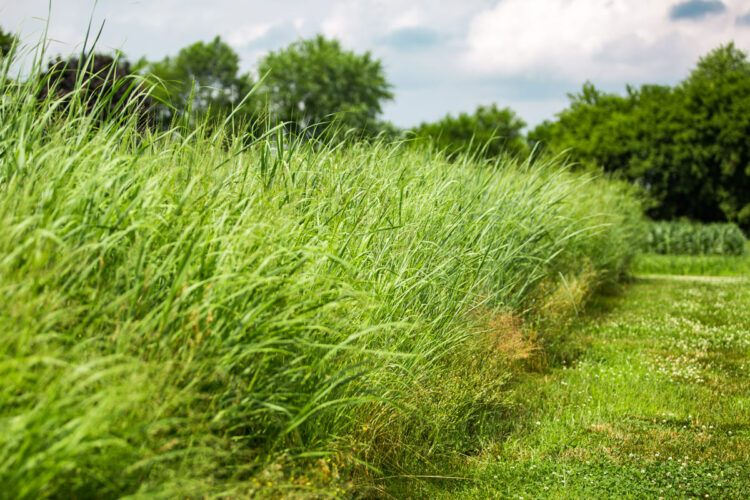01/08/2023
Strong Climate Mitigation Potential of Switchgrass Grown on Marginal Lands
Requires low initial soil organic carbon content

A field of switchgrass at Michigan State University’s Kellogg Biological Station.
[Image courtesy of the Great Lakes Bioenergy Research Center.]
The Science
Maintaining a global temperature increase below 1.5°C relies significantly on the large-scale deployment of negative CO2 emissions (carbon dioxide removal) technologies. Those particularly applicable to cellulosic biofuel production systems are soil organic carbon sequestration and carbon capture and storage.
Great Lakes Bioenergy Research Center researchers estimated the global warming intensity and greenhouse gas mitigation potential of biofuels produced from switchgrass grown on marginal land in Michigan. They found that the lands could potentially produce more than 150 million gallons of biofuels from nitrogen-fertilized switchgrass, of which 96% meet the Renewable Fuel Standard and 73% to 75% are carbon negative. However, carbon storage decreases in wetlands and other carbon-rich soils, resulting in biofuels with higher global warming intensity than gasoline.
The Impact
This research highlights the strong climate mitigation potential of biofuels derived from switchgrass grown on marginal lands, as well as the need to avoid planting in carbon-rich soils.
Summary
Researchers estimated the global warming intensity (g CO2 MJ−1) of biofuel produced from switchgrass grown on recently tilled abandoned farm fields and other marginal lands in Michigan, with and without fertilizer, and its greenhouse gas mitigation potential (Mg CO2 year−1). Soil organic carbon changes and biomass yields were estimated using the system approach to land use sustainability (SALUS) model. Results were used to populate both a static (time-independent) and dynamic lifecycle assessment to calculate global warming intensity and greenhouse gas mitigation. The time-independent global warming potentials were considered under both the static and dynamic approaches to compare with the global warming intensity of gasoline (93.08 g CO2 MJ−1 with a time horizon of 100 years.
Principal Investigator
Seungdo Kim
- Michigan State University
[email protected]
BER Program Manager
Shing Kwok
U.S. Department of Energy, Biological and Environmental Research (SC-33)
Biological Systems Science Division
[email protected]
Funding
This article is based upon work supported by the U.S. Department of Energy, Office of Science, Biological and Environmental Research program (DE-SC0018409); USDA NIFA; and Michigan State University AgBioResearch program.
References
Kim, S., et al. 2023. “Global Warming Intensity of Biofuel Derived from Switchgrass Grown on Marginal Land in Michigan,” GCB Bioenergy 15(3), 319-331. DOI:10.1111/gcbb.13024.
